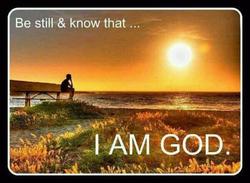Hi Tamela,
You ask Vic, "A sincere question: In Matthew 16:17-19, specifically when Jesus says, "You are Peter, and upon this rock I will build my church, and the gates of the netherworld shall not prevail against it..."
How do we know that Jesus wasn't talking about the ground itself? Couldn't 'The rock' have been the ground Peter and Jesus was standing on at that moment.
Jesus could have just as easily said, 'You are Peter and through you I will build my church...' or 'You are Peter and in you I will build my church...', etc., but He doesn't.
Are there other verses in the Bible that shows Jesus referred to Peter as a 'Rock' which would make these verses clearly understood that Jesus was saying that Peter would be the church? I honestly don't know if there are other verses but if there were it would help me to understand these verses better."
I have answered these comments and questions from Vic and other Roman Catholic Forum Friends a number of times before. So, let me offer what David Guzik, senior pastor of Calvary Chapel Santa Barbara, and previously Director of Calvary Chapel College in Germany, has written in his Study Guide For Matthew 16, found at: http://www.blueletterbible.org...hew&ar=Mat_16_13
1. John 16:13: Jesus asks the disciples to tell Him who others say He is.
"When Jesus came into the region of Caesarea Philippi, He asked His disciples, saying, 'Who do men say that I, the Son of Man, am?' "
a. "Who do men say that I, the Son of Man, am? Jesus did not ask this out of insecurity or a lack of full awareness of His identity; nor is He conducting a public opinion poll. Jesus asks this because He wants His disciples to know who He is."
2. John 16:14-16: A pointed question and a pointed answer.
b. Who do you say that I am? This is the question placed before all who hear of Jesus; and it is we, not He, who are judged by our answer.
i. In fact, we answer this question every day by what we believe and do. If we really believe Jesus is who He says He is, it will affect the way that we live.
c. You are the Christ, the Son of the living God: Peter boldly exclaims the truth about Jesus -- that He is not only the Messiah (the Christ), but that He is also God.
i. The Jews properly thought that to be the Son of the living God, in a unique sense, was to make a claim to deity itself.
3. John 16:17-20: Jesus commends Peter for His bold and correct declaration.
"Jesus answered and said to him, 'Blessed are you, Simon Bar-Jonah, for flesh and blood has not revealed this to you, but My Father who is in heaven. And I also say to you that you are Peter, and on this rock I will build My church, and the gates of Hades shall not prevail against it. And I will give you the keys of the kingdom of heaven, and whatever you bind on earth will be bound in heaven, and whatever you loose on earth will be loosed in heaven.' Then He commanded His disciples that they should tell no one that He was Jesus the Christ."
a. Flesh and blood has not revealed this to you, but My Father who is in heaven: Jesus reveals to Peter that he spoke by divine inspiration, even if he didn’t even know it at the time.
i. We too often expect God to speak in strange and unnatural ways. Here God spoke through Peter so naturally that he didn’t even realize his Father who is in heaven revealed it to him.
b. I also say to you that you are Peter: This is not only a recognition of Peter’s more Roman name, it is also a promise of God’s work in Peter. The name Peter means "Rock." Though it may be hard to believe, Peter was a rock, and would become a rock, God transforming his naturally extreme character into something solid and reliable.
c. On this rock I will build My church: The words this rock have been the source of much controversy. It is best to see them as referring to either Jesus Himself (perhaps Jesus gesturing to Himself as He said this), or as referring to Peter’s confession of who Jesus is.
i. Peter, by His own testimony, did not see himself as the rock on which the church was founded. He says that we are living stones, but Jesus is the cornerstone (1 Peter 2:4-7).
ii. I will build My church: This is a clear claim of ownership. The church belongs to Jesus.
c. And the gates of Hades shall not prevail against it: Jesus also offers a promise - the forces of death and darkness can’t prevail against or conquer the church. This is a precious promise in the heat of battle, assuring us that victory is sure.
d. And I will give you the keys of the kingdom of heaven: The idea is not that Peter will admit people to heaven, but that Peter opened the door of the kingdom to both the Jews (Acts 2:38-39) and the Gentiles (Acts 10:34-44).
e. And whatever you bind on earth will be bound in heaven, and whatever you loose on earth will be loosed in heaven: The power for binding and loosing is something that the Jewish rabbis of that day used. They bound or loosed an individual in the application of a particular point of the law.
Jesus promises that Peter - and the other apostles - would be able to set the boundaries authoritatively for the New Covenant community. This was the authority given to the apostles and prophets to build a foundation (Ephesians 2:20).
In summary, Jesus told Peter that "upon the FAITH displayed by Peter" He, Jesus Christ, would build HIS CHURCH, HIs body of believers worldwide. And, Jesus promised that neither Satan nor the Gates of Hell could defeat His church.
And, this we know because Jesus defeated Satan when He went to the cross. On the cross He defeated Satan and death, and with His resurrection He assured that all people will be resurrected to eternal immortal life: believers to eternal life in the presence of God; non-believers to eternal life void of the presence of God.
And, Jesus told Peter, and the other apostles, that they would be able to set the boundaries of Christian authority with His body of believers. They did this through the writings we call the Bible, the canonized Written Word of God. This, in no way, indicated that Peter, or any of the apostles, could give or deny a person eternal salvation. Only God can do that!
God bless, have a wonderful, blessed day,
Bill



